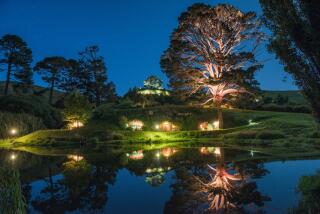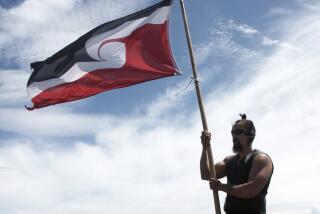World Turns to New Zealand for Timely Answers
AUCKLAND, New Zealand â Isolated in a remote corner of the globe, New Zealand is hoping to impress the world Saturday as the arrival of 2000--and its accompanying Y2K uncertainties--propels it to center stage.
For more than a year, New Zealand has readied for its few moments of fame when proximity to the international date line makes it the first industrialized nation to greet the new year and cope with the vagaries of the Computer Age.
For California and the rest of the computerized world, New Zealandâs âearly warning systemâ amounts to a moment of truth: Will all the efforts to reconfigure computers to recognize the new year as 2000 and not 1900 have been for naught? This island nation--where midnight struck today at 3 a.m. PST--is the first place able to supply an answer.
âWe are the guinea pig for the world,â said Jan Haynes of the New Zealand Media Resource Unit. âIf anything goes wrong here, everyone else has time to do something.â
Meanwhile, New Zealand has seized the moment. Millions of dollars have been poured into sprucing up infrastructure, promoting tourism and preparing a world-class New Yearâs celebration--all intended to erase the image of New Zealand as merely âan efficient offshore farm for the United Kingdom.â
So much for the jokes about New Zealand resetting its sheep.
âWhile the attention of the world is focused on us, we want to convey that this is a great place to visit and do business,â said Sharon van Gulik, manager of the New Zealand Millennium Office. âWe want to plant an indelible collection of images in peopleâs minds so they will think about us in the future.â
Not since French intelligence agents slipped into Auckland harbor in 1985 and blew up the Greenpeace vessel Rainbow Warrior has a single moment so riveted attention on this English-speaking country in the South Pacific roughly the size of California but with one-tenth its population.
Governments and corporations from around the world have established Y2K links in New Zealand aiming to glean vital information about the behavior of computers in the first moments of 2000.
Californiaâs âFollow the Sunâ program to track Y2K developments in earlier time zones is piggybacking on tests and evaluations made in New Zealand by Silicon Valley companies Cisco Systems and Hitachi Data Systems Corp.
John Good, special advisor to New Zealandâs Y2K Readiness Commission, said most of the links are industry-to-industry: the telecommunications industry in the U.S. with a similar group in New Zealand, electrical utilities with the utility monitoring unit here.
Good said suppliers of critical computer components, especially from Japan, sent technicians to New Zealand to âliterally sit by their equipment and report back to their home office if there are any problems.â
Bob LaRue, Y2K program manager for Pacific Gas & Electric Co., said New Zealand, along with Australia, Israel, South Africa and Britain, was selected as an early warning site for the utility industry because it has undertaken Y2K preparation efforts similar to those in the United States.
âIf they havenât spent the same kind of time and diligence that we have to fix the problems, it doesnât do us much good to know what is happening,â LaRue said. âWhat happens in Zimbabwe, for example, doesnât have much relevance in the United States. But what happens in New Zealand can be very helpful.â
Mindful of its role as a global computer watchdog, the Y2K Readiness Commission in New Zealand took steps to protect its monitoring systems from hackers. If cyber-terrorists infiltrated the system and altered the information being distributed around the world, government officials said, it could create international panic, especially because several financial markets were open as New Zealand celebrated the new year.
Days before the arrival of 2000, officials in New Zealandâs critical industries said they spent millions to correct Y2K problems and didnât expect trouble at midnight. Even so, electric utilities, the telephone system and the Reserve Bank planned to have extra staff on duty.
Although banks will not be open until Jan. 5 because of public holidays, bankers wanted to monitor money machine and credit card transactions, to assure the world that the monetary system did not appear to have any computer glitches. They said they were fearful that any bad news from New Zealandâs banking system could cause a run on banks elsewhere, particularly the United States.
Other, less critical operations were taking minor precautions. At the Auckland Zoo, dangerous animals were locked in special enclosures in case power outages disabled electrical fences.
The ports of Auckland required incoming ships to prove their Y2K compliance and warned that, if there were any doubts about the readiness of vessels due to arrive in the new year, the ships would be required to wait in the harbor until on-board inspections were complete.
Still, for many New Zealanders, Y2K took a back seat to celebration plans.
In Auckland, the nationâs largest city, thousands of vacationers were expected to join local residents at the waterfront at midnight to witness a spectacular fireworks display.
And a free, three-hour theatrical extravaganza was planned to lead up to the event. Not content to simply depict the major events of the past 1,000 years, the production called for a cast of 900 to reenact the birth of Jesus, the rise and fall of the Roman Empire, Marco Poloâs travels, the Black Death of the Middle Ages, Galileoâs work and that of Shakespeare, Mozart and Newton, as well as the two world wars.
A television hookup was expected to reach a billion people around the world, featuring 75 minutes from events in New Zealand. Tourist officials hope that the exposure will help promote two other local events--the Americaâs Cup yacht race in February and March and New Zealandâs hosting of the Asia-Pacific Economic Cooperation conference in September--and raise the nationâs profile around the world.
âWeâre not necessarily trying to bring hordes of tourists to New Zealand for the new year,â said Van Gulik, the manager of the millennium office. âWe are trying to create a legacy.â
But hordes of tourists have come, attracted by the balmy summer weather and the opportunity to say they were among the first to greet 2000.
Russell Lees, director of Bush and Beach Ltd., which conducts tours of bush areas, said most of his trips have been fully booked between Christmas and New Yearâs, a period when his business is normally quiet.
At the New Zealand visitor center, manager Andrea Birtwistle said she had seen a large increase in traffic, spurred in part by a number of huge cruise ships docking in Auckland for New Yearâs.
âIf the worldâs going to end, this is a much nicer place to be this time of year than Minnesota,â said Jesse Mills, a 20-year-old backpacker from Duluth.
More to Read
Sign up for Essential California
The most important California stories and recommendations in your inbox every morning.
You may occasionally receive promotional content from the Los Angeles Times.










